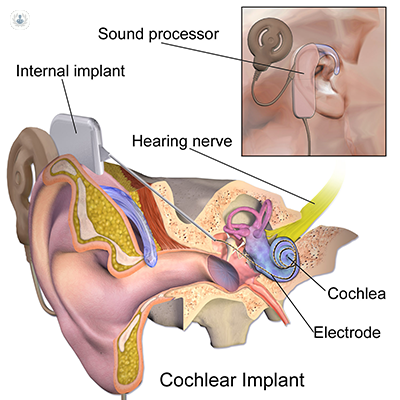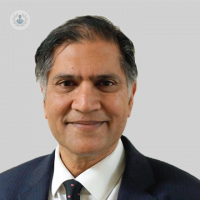Cochlear implants: life-transforming technology for hearing loss patients
Written in association with:Cochlear implants can transform the lives of many people. They are used to restore hearing in adults or children who have severe to profound inner ear hearing loss. Professor Manohar Bance, one of the UK’s leading otologists, gives us an overview of cochlear implants and the conditions these implants can help improve.

How do cochlear implants work?
The inner ear takes sound signals and converts them into nerve impulses to your brain. Cochlear implants work by turning sound signals into electrical signals, bypassing the damaged inner ear hair cells and directly stimulating the hearing nerves.
Cochlear implants have an inside implanted part, and an outside part with a microphone, battery and a coil that transmits across the skin. This is very different from the way the ear is usually stimulated by sound energy. These implants can lead to life-transforming changes in hearing, such as being able to use the telephone for many people and improved speech production.

How effective are they?
While cochlear implant hearing is a major improvement from being deaf, the restored hearing is not normal. It can sound very robotic at first, but for most people, it quickly becomes more natural sounding. However, music is likely to sound unnatural and when there’s a lot of background noise, people with cochlear implants do not do as well as people with lesser degrees of hearing loss.
There is a long period of working hard with the audiologist to train your brain to make sense of this different type of hearing, and you must be prepared for that. Nowadays, many implants have Bluetooth and are connected so you can take phone calls, listen to music, etc. right on your cochlear implant.
How much do cochlear implants cost?
The NHS will pay for a single cochlear implant if you meet the criteria of having at least 80dB hearing loss at any two or more frequencies for adults and you are not doing well with your current hearing aids. For children, the NHS will pay for two implants, one on each side.
The NHS doesn’t pay for bilateral (both sides) cochlear implants in adults, implants for severe tinnitus (this would not be considered even privately unless you have severe hearing loss) or for people who are really struggling with their hearing aids and don’t meet the NHS’s new NICE criteria.
I have worked with cochlear implants for over 20 years and I also run an active research program in cochlear implants. Although they have improved, they are still not perfect, and people need careful counselling before they undertake this intervention with an experienced and specialised cochlear implant audiologist. We are lucky to have access to many experienced audiologists.
Below are some of the indications for cochlear implants that are not covered by the NHS.
Second sided cochlear implant in adults
Two ears are better than one. People have to put less effort to hear people with two implants, can hear better in background speech, and if a part breaks in one, there is always a backup.
A second side implant can be a good option if your second side has not been deprived of hearing for too long, meaning if you have worn hearing aids or had some sound in that ear in the last 10-20 years.
Single-sided deafness (SSD)
As mentioned above, two ears are better than one. While aids like CROS hearing aids and bone conduction hearing aids (BAHAs) can take the sound from your deaf ear to your good ear, they don’t actually give back the hearing you don’t have in that ear, they just make you aware of sound on your deaf side. However, a a cochlear implant can truly restore hearing in the deaf ear.
In practice, this means that while you might be aware of sound on your deaf side with CROS hearing aids and BAHAs, they won’t help you localise sound or help with background noise. SSD requires careful counselling because if you have normal hearing in one ear, the electric hearing in the other ear can be difficult to get used to. However, many people, in various countries where SSD is funded for a cochlear implant, have received them and are pleased with the outcome.
Tinnitus
In general, tinnitus improves with cochlear implantation and sometimes we might consider this in an ear that doesn’t meet the criteria for implantation based on hearing loss, but with severe hearing loss. However, you should meet with our tinnitus counsellor prior to this decision.
Cochlear implants in patients whose hearing is not bad enough to meet NHS criteria for implantation
There is no ‘magic’ hearing loss number at which a cochlear implant will help you more than a hearing aid. The NHS criteria are stricter than in many other countries such as USA, Canada and in other parts of Europe, where patients with hearing loss of only 70dB are implanted. Many people with hearing loss between 70 and 80dB struggle a lot to cope with their hearing aids, but are not deaf enough to qualify for a cochlear implant. This group may do better in some cases with a cochlear implant.
All of the above scenarios require careful evaluation, and preoperative counselling before making a decision. With over 20 years of experience with cochlear implants, of all major makes, I do not believe in jumping into surgery before we understand your needs and expectations.
If you are interested in talking to Professor Manohar Bance about cochlear implants, visit his profile and book a consultation.


